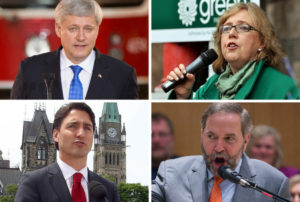 The 2015 Canadian federal election campaign has been marred with a series of embarrassing gaffes and candidate resignations.
The 2015 Canadian federal election campaign has been marred with a series of embarrassing gaffes and candidate resignations.
The most well-known example is probably #peegate, where Tory candidate Jerry Bance was caught on video urinating in a coffee cup and forced to step down in embarrassment. Another Conservative candidate, Tim Dutaud, was also forced to resign after videos surfaced of him making harassing prank calls.
But it’s not only the Tories who’ve been caught with their pants down — in the case of Bance, literally — here. All the major parties have been caught out in scandals during this campaign, with candidates being forced to step down due to Facebook posts, Twitter tweets and other offhand comments coming to light — some of which were posted years ago. From racism to sexism, from drug references to Nazi comparisons, a casual observer of this election would be forgiven for thinking that the only people running for leadership of this country are the worst of the worst of our citizens.
It begs the question: Have our political candidates gotten worse? Or has the internet’s memory simply gotten better?
The game has changed
There was a time, not so long ago, when most of these candidates’ sins and gaffes would have remained undiscovered. They would have been elected without much fanfare. And yes, that would have included some boneheads like Jerry Bance. But it probably would have included some otherwise average, ordinary politicians who would have done decent jobs, despite once having gotten drunk in college and made stupid comments.
Global News producer Anna Mehler Paperny outlines the challenge of modern-day politics thus:
Chances are there’s something you’ve done at some point in your life that you wouldn’t want the entire world to know about.
And chances are, if you ever run for political office (or work for someone who is), the entire world will know about it.
And, as she notes, it creates problems of its own. Because it’s 2015, and everyone has a social media presence and a long history of stuff they’ve said, written, emailed, texted, tweeted and posted to Instagram or YouTube. If someone doesn’t have a social media presence, then that’s all kinds of suspicious on its own. Is that person a cipher? How can we trust a political candidate with no presence, no voice, no history or accomplishments or name recognition?
Political parties who err on the side of too much caution and look for people with no social media presence could end up recruiting the modern-day equivalent of the Unabomber.
Unrealistic expectations?
We want our leaders to be real people. We want them to engage in authentic dialogue. We ask for glimpses into their personal lives, for question and answer sessions. We decry the likes of Stephen Harper — justifiably, I might add — for never going off script and for tightly controlling his message at every public appearance. We look for “refreshing” candidates who aren’t afraid to be honest and real. But that amount of spontaneity also means that there will be times when people make mistakes or say things that they wish they could take back.
We can and should demand that our leaders be good people, with good intentions, a modicum of intelligence, and some judgment and good sense. That’s fair.
But it goes too far when we expect everyone who runs for office to have no embarrassing moments in their past. Everyone does. If they don’t, they’re either robots who’ve known from the age of three that they would one day run for office and have been carefully crafting their message strategy ever since, or else they’re truly terrible people who are better than the average candidate at hiding their sins.
When we have unrealistic expectations of our leaders, then we also are asking to be lied to and misled.
Immune to shame
We’re also diminishing the quality of our candidates, because otherwise decent people who have made honest mistakes will shy away from a game where every last word they’ve ever said could be shared with millions of people in an attack ad. That leaves only the power-hungry morally bankrupt idiots, who are so awful that they simply don’t care.
Just look at the US, where Donald Trump is currently leading in the polls. He’s arguably the perfect social media-era candidate: Someone who has said so many horrible and embarrassing things — past and present — that he’s simply immune to attacks about them.
Or, closer to home, look at Rob Ford’s political success, earned in a similar way. He kept outdoing himself, brazenly and unapologetically saying and doing worse and worse things until we all kept watching with a sort of morbid fascination just to see what he’d do next. Anyone else would have resigned months earlier, when the first allegations came to light. But not Ford.
The only candidates who can survive the social media era, it seems, are the ones who have no shame. Are those really the people we want as our leaders?
It’s a cautionary tale. The internet forgets nothing and the political machine forgives nothing. But maybe we ought to.

